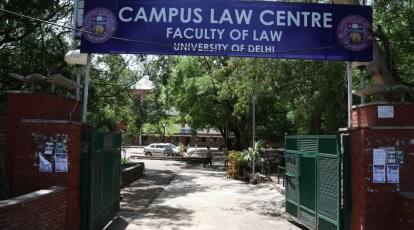Vidushi Vats
In a significant shift from its previous position, the University Grants Commission (UGC) has formally endorsed Delhi University’s recent resolution. This entails that admissions to the University’s recently launched five-year integrated law programs will be determined exclusively by the CLAT-UG 2023 scores, as opposed to the previously proposed Common University Entrance Test (CUET).
It all started with the DU Notification dated August 4, which states that “The Bar Council of India in its letter dated 26.07.2023 has accorded its approval of 60 seats for BA LLB (Hons) and 60 seats for BBA LLB (Hons). Admission to BA LLB (Hons) and BBA LLB (Hons) shall be based on merit in the Common Law Admission Test (CLAT) UG 2023 result. The classes for BA LLB (Hons) and BBA LLB (Hons) courses will be held at the Faculty of Law, Kanad Bhawan, North Campus, University of Delhi. The online application for admission to BA LLB (Hons) and BBA LLB (Hons) courses will be announced by the University soon.”
The UGC had previously asserted that scores from the Common University Entrance Test (CUET) are obligatory for both undergraduate and postgraduate admissions in Central universities, including DU.
On August 25, the High Court acknowledged the statement made by the UGC’s counsel, affirming that it is “mandatory for all central universities to adhere to the CUET for admission to UG/PG programmes.” Subsequently, the High Court requested both the UGC and the Union of India to submit a comprehensive counter affidavit.
The UGC’s counter affidavit contested a plea lodged against Delhi University’s decision. In a bid to have the plea “dismissed,” the affidavit references the Common Law Admission Test (CLAT) as a “centralized national-level entrance test for admission to Law programmes”. This test has predominantly been embraced by the esteemed National Law Universities in India for the admission of students into Law programs.
The Centre in its affidavit has said the admission standards for professional courses are “shaped by the specialized nature and specific skill sets demanded by these programs” and need to be guided by the “distinct prerequisites of each course”.
The affidavit cites the National Education Policy (2020), which envisions the governance of higher education institutions by “highly qualified independent Boards with academic and administrative autonomy.”
The Centre’s affidavit emphasizes that the University of Delhi is a Statutory Body and a leading Higher Educational Institution/Central University with autonomous authority over its daily operations. It further highlights that the admission process for its diverse professional courses and programs is regulated by the University’s distinct statutes, Rules, Regulations, Ordinances, and Notifications. The affidavit also urges the dismissal of the plea.

